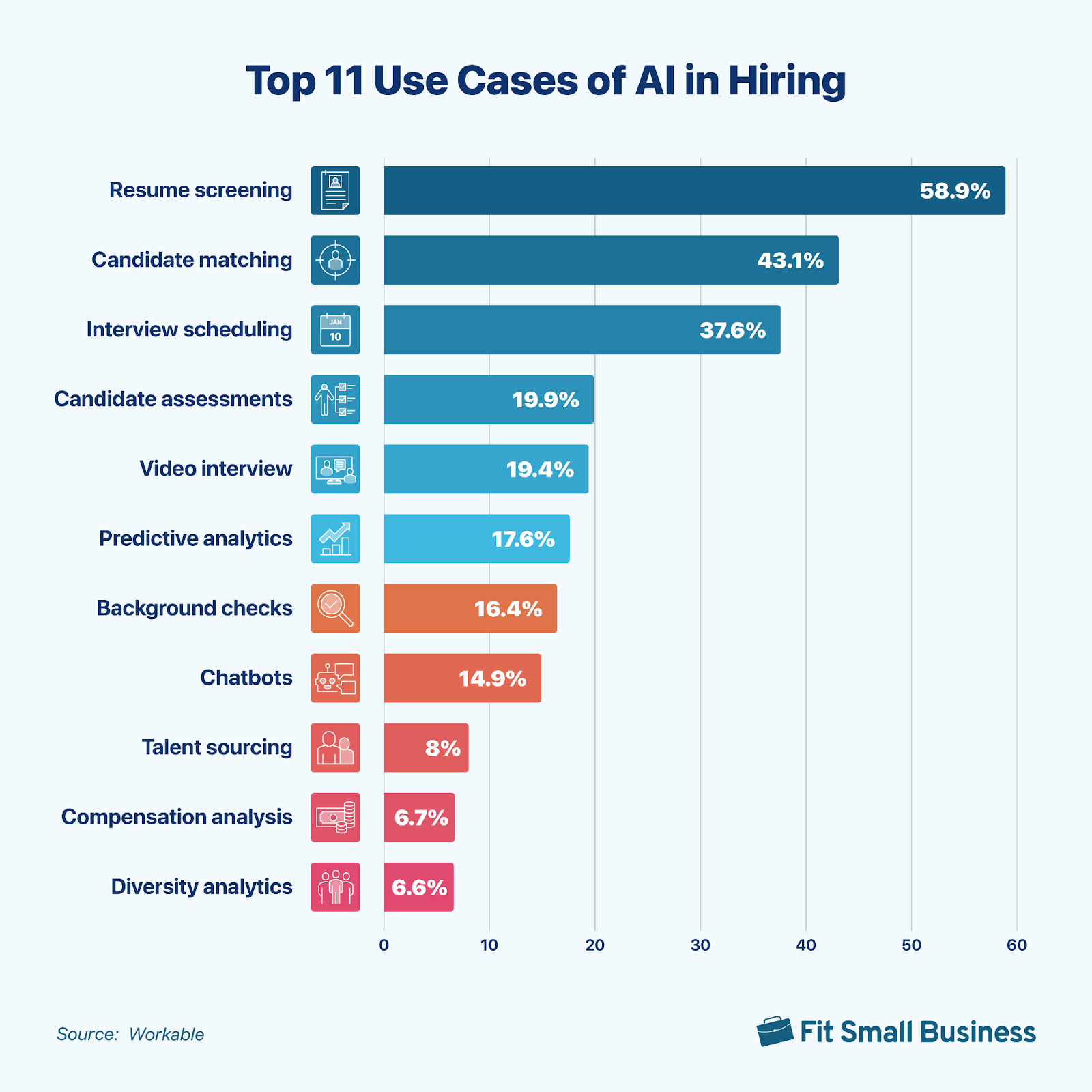The integration of artificial intelligence (AI) in recruitment processes has transformed the hiring landscape. As we reach the fourth quarter of 2024, AI continues to revolutionize how companies attract, assess, and select talent. This article explores 12 AI hiring statistics and their impact on efficiency, candidate experience, and diversity initiatives.
Recruitment Efficiency & AI
-
45% of HR professionals report having more time to fulfill tasks because of AI adoption
As AI automates the more mundane tasks (i.e., resume screening and scheduling interviews) of recruiting, recruiters have more time to dedicate to more important tasks, such as building relationships with candidates, developing recruitment strategies, employer branding, and talent marketing.
(LinkedIn – The Future of Recruiting)
-
Organizations that use AI are 89.6% more efficient with their hiring process
According to a survey by Workable, organizations using AI said it helped them speed up their hiring process significantly. Aside from that, they were also able to save on time (85.3%) and cost (77.9%).
(Workable)
-
62.5% of respondents say that they use AI in hiring
This figure shows AI in hiring, indicating a significant adoption of artificial intelligence in the recruitment and selection process. The top three use cases of AI in hiring include resume screening, candidate matching, and interview scheduling.
(Workable)

Impact of AI on Job Market
-
About two-thirds of US job seekers are still wary of the use of AI in hiring
A lot of Americans still view AI negatively, with 66% saying they will not apply to a job if AI is used in the hiring decision. Furthermore, 70% of women expressed the same sentiments on the use of AI when making a hiring decision.
(Pew)
AI Adoption
-
60% of companies are using generative AI in at least one of their functions
In McKinsey’s 2023 State of AI report, more than half of organizations that have already adopted AI are also using generative AI (a type of artificial intelligence that can produce different types of content—from text to images).
(McKinsey – The State of AI in Early 2023)
-
62% of talent acquisition professionals are optimistic about AI’s impact on recruitment
LinkedIn’s report revealed that 27% of hiring professionals are already using or experimenting with generative AI. Meanwhile, 24% are partnering with business leaders to understand the potential of AI to transform jobs before implementing changes.
(LinkedIn – The Future of Recruiting)
-
65% of businesses are either using or exploring Gen AI in their operations
According to McKinsey, the number has doubled since they conducted the survey in 2023. The respondents have high expectations of Gen AI’s impact. Furthermore, three-quarters of the respondents believe that AI will continue to bring disruptive changes to their industries.
(McKinsey – The State of AI in Early 2024)
-
90% of business executives are planning to hire more because of Gen AI
According to Upwork, they have observed that there is an increase in the number of job posts and talent earnings with the introduction of generative AI. The report further revealed that there are a growing number of opportunities on job posts related to the following skills:
- AI content creation
- Prompt engineering
- Natural language processing (NLP)
- Engineering and architecture
- Data science and analytics
- Accounting and consulting
(Upwork)
Diversity and Inclusion
-
62% of candidates believe AI can make the process more human
According to Aptitude Research by Paradox, organizations that use AI in their talent acquisition process are bound to improve not only their candidate experience but also their DEI initiatives. The research said that organizations can do this by enhancing transparency through meaningful communication and auditable records.
(Paradox)
-
47% of American job seekers believe there will be less hiring bias with the use of AI
While there are still a lot of Americans who view AI use negatively, almost half believe that racial and ethnic bias in hiring will be reduced with the use of AI in evaluating and hiring candidates.
(Pew)
-
Only 27% of companies are prioritizing trustworthy AI in terms of reducing bias
While some efforts are being made towards trustworthy AI, such as creating ethical policies (44%), explaining AI decisions (41%), and tracking data provenance (37%), there’s a notable lack of focus on reducing bias and promoting DEI. This gap between policy creation and practical implementation of fairness measures is increasingly evident in recent events.
(IBM Global AI Adoption Index 2023)
-
Only 6.6% of HR professionals are using AI for diversity analytics
Despite the widespread adoption of AI in hiring processes, with 62.5% of companies using AI for recruitment, only a tiny fraction (6.6%) of HR professionals are leveraging AI specifically for diversity analytics to ensure diverse hiring. This contrast reveals a critical gap in using technology to promote DEI.
(Workable)
Bottom Line
These statistics indicate that AI will continue to impact talent acquisition in the coming months and years. While it still faces a lot of challenges and resistance, more organizations are realizing the advantages it brings. These include more efficient candidate selection, a reduced hiring process, and the elimination of unconscious bias. As HR continues to adopt AI, we can expect to see wider implementation across various aspects of recruitment.
Reference: FnF Research, McKinsey (The State of AI in 2023, The State of AI in Early 2024), Upwork, Paradox, Pew, Workable, LinkedIn (The Future of Recruiting), IBM Global AI Adoption Index 2023